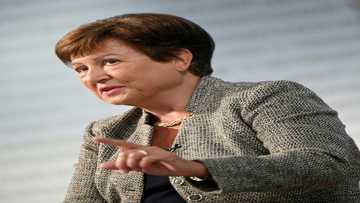OECD ups world growth forecast but sees Middle East 'risk'

Source: AFP
The OECD raised its 2024 world economic growth forecast Monday but warned that the Middle East conflict posed a risk, with disruptions in Red Sea shipping threatening to increase consumer prices.
The OECD now expects a 2.9 percent expansion, up from 2.7 percent in its previous forecast in November, as it sharply lifted the outlook for the United States, the world's top economy.
Global growth "proved unexpectedly resilient" in 2023, reaching 3.1 percent as inflation declined faster than anticipated, with strong growth in the United States and emerging markets offsetting slowdowns in European nations.
But indicators suggest "some moderation" of growth, with higher interest rates affecting the credit and housing markets while global trade remains subdued, according to the Organisation for Economic Cooperation and Development.
While inflation is falling in major economies, "it is too soon to be sure that underlying price pressures are fully contained", the OECD added in an update to its annual economic outlook.
The OECD highlighted the threats from the war between Israel and Hamas in Gaza, and the attacks on ships in the Red Sea by Yemeni rebels who say they were targeting Israel-linked ships in solidarity with the Palestinians.
PAY ATTENTION: Click “See First” under the “Following” tab to see YEN.com.gh News on your News Feed!
US and UK forces have responded with strikes against the Huthi rebels, who have since declared American and British interests to be legitimate targets as well.

Source: AFP
"High geopolitical tensions are a significant near-term risk to activity and inflation, particularly if the conflict in the Middle East were to disrupt energy markets," the report said.
"A widening or escalation of the conflict could disrupt shipping more extensively than presently expected, intensify supply bottlenecks, and push up energy prices if traffic is interrupted in the key routes for the transport of oil and gas from the Middle East to Asia, Europe and the Americas."
Around 15 percent of global maritime trade volume passed through the Red Sea in 2022, according to the OECD.
The attacks have sharply raised shipping costs and lengthened delivery times of goods as companies have rerouted their vessels around the southern tip of Africa, increasing their journey by as much as 50 percent, it said.
Production schedules have been disrupted in Europe, notably for automakers, the report said.
The recent 100 percent increase in shipping costs, if persistent, could add 0.4 percentage points to consumer prices inflation after about a year, the OECD warned.
'Lingering effects' of rate hikes
The organisation said monetary policy needs to "remain prudent" to ensure that inflationary pressure is "durably contained".
The US Federal Reserve, the European Central Bank and the Bank of England raised interest rates sharply in efforts to rein in consumer prices that rose after the Covid pandemic and jumped further after Russia's invasion of Ukraine.
"Growth could also be weaker than projected if the lingering effects from past policy rate increases are stronger than expected," the OECD said.
The three central banks have recently paused their rate-hike campaigns and have kept them at high levels.
But markets are hopeful that policymakers will soon begin to cut rates as inflation has slowed in major economies, though it remains above two-percent targets.
Inflation this year is expected to slow to 2.3 percent in the United States, 2.6 percent in the eurozone and 3.6 percent in Britain, the OECD projected.
The US economy is forecast to grow by 2.1 percent percent in 2024, up from from 1.5 percent in the previous outlook.
But the eurozone's outlook was downgraded to 0.6 percent growth from 0.9 percent previously.
The forecast for China, the world's second biggest economy, remained unchanged at 4.7 percent.
New feature: Сheck out news that is picked for YOU ➡️ click on “Recommended for you” and enjoy!
Source: AFP




